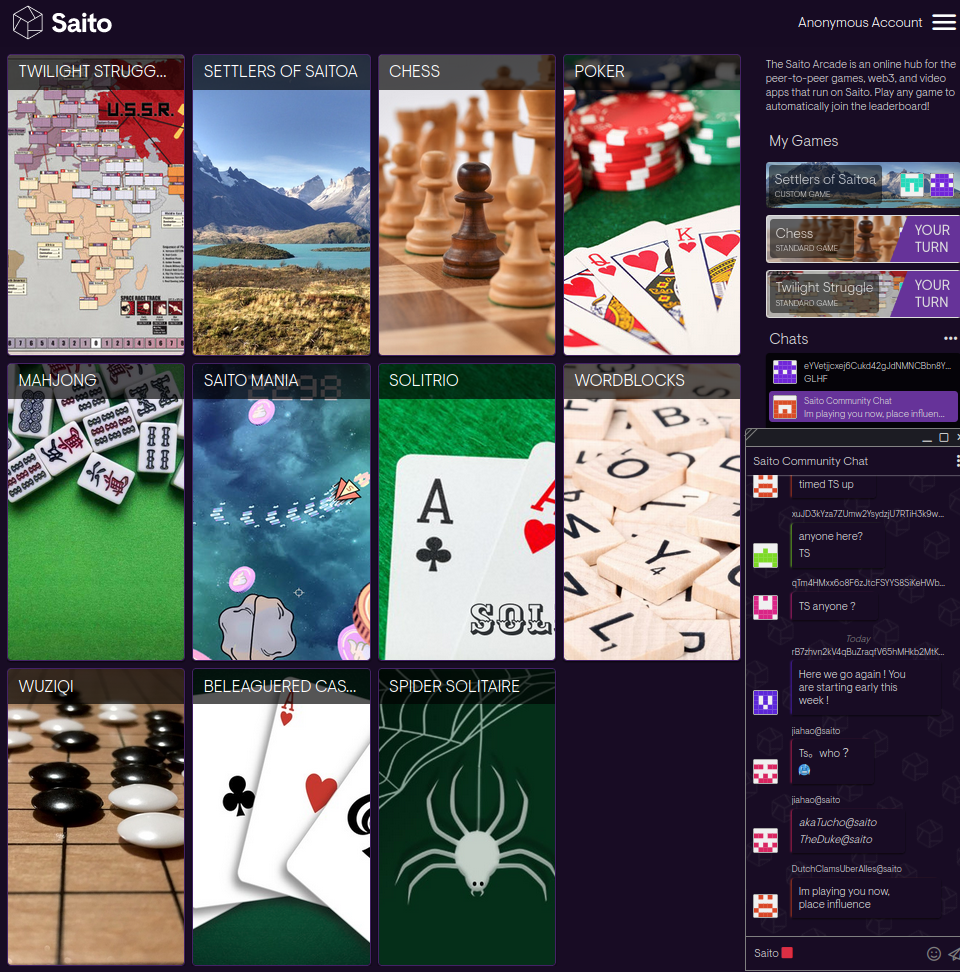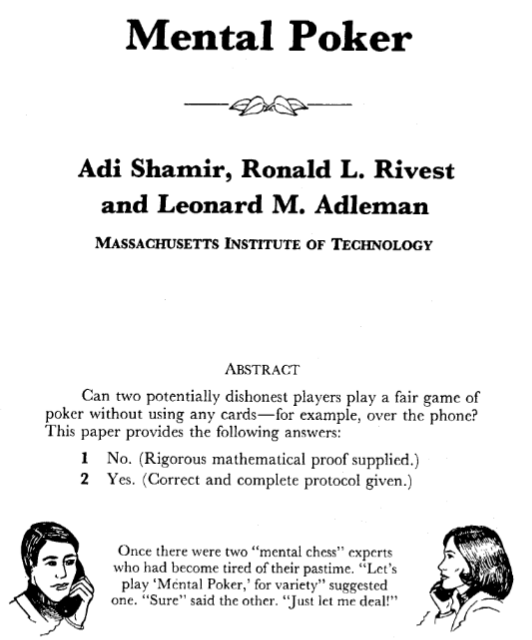¶ Arcade
Saito Arcade is an open source gaming portal that runs as a fully-distributed peer-to-peer browser application. It serves as a hub for any installed game built with the Saito Game Engine - a system which allows trustless P2P games, even complex games, with advanced public key cryptography.
We believe that the Arcade and its games offer some of the richest, most enjoyable and advanced web3 gaming implementations across all of crypto gaming.
- Arcade source code.

The sophisticated cryptographic techniques ensure provably-fair gameplay without the need for a trusted third-party, and this allows multiplayer games without any server. Unlike other game engines with similar goals, Saito's supports more than two players and has been generalized to underpin any turn-based game, not just Poker.
Saito's setup also uniquely benefits from using the blockchain as a secure and open PKI layer which means users don't need to coordinate their connections through a trusted entity who can undermine their security.
For these reasons the Web3 Foundation has recognized the Saito Game Engine as a standard for open games.
I like this idea and think it provides something REALLY valuable to the ecosystem, and takes blockchain gaming in a very different (and good!) direction
- Bill Laboon, Head of Education and Grants at Web3 Foundation
¶ Why Build an Open Source Arcade?
High quality games with significant followings often struggle to make money from digital sales. Companies like Apple and Google force developers to list games at extremely low prices to compete for visibility in their distribution channels, and then restrict how publishers can collect money from users.
Web 2 forces publishers to revert to selling physical editions, merchandise, access to lightly-veiled gambling boxes or tokens of questionable utility and origin. Saito blurs the line between developer and publisher through new and better business models which rid developers of the need to pay rent to centralized, digital storefronts.
Saito Arcade, and Saito generally, is an open index of applications which any node, full or lite, can earn fees for serving to users. Open source developers can thus route their application's transactions into the network and earn the larger part of that fee. Developers can easily and permissionlessly become their own publishers with no middleman - not even a financial middleman.
- Saito revolutionizes open source monetization.
The best games may still gravitate towards free-to-play models, but alternative services and their monetization are not to be restricted: leaderboards, ranking and match-making services, and more will attract fee-paying users. Game designers on Saito have the freedom to experiment with these services and monitization without asking permission.
Some games may be better off integrating decentralized advertising networks, collecting micro-payments between games or rounds, while others can rely on donations, tournaments, Swarmcasts - and all such services will lead to rewards for the nodes providing them!
¶ Saito Game Engine
For question of how the Saito Game Engine allows multiple parties to fairly agree on the state of truly random elements necessary for many games on the arcade, the answer begins with Mental Poker:

Indeed, the most direct implementation of the techniques devised by Rivest, Shamir and Adleman (RSA) are seen, extended and enhanced in Saito's very own, peer-to-peer, Web 3 Poker - available to play on the arcade or to audit on Github.
Mental Poker exploits the commutative properties of public key encryption schemes to encrypt deck of cards using the keys of each player, and shuffle it while nobody is able to decrypt it. Cards can then be progressively decrypted by all players as determined by the game rules. A more complete explanation can be sought via Wikipedia.
The Saito Arcade has taken the principles of Mental Poker and generalized the techniques to support several adversarial players and to encode and integrate arbitrary values which extend far past a simple game of Poker. Titles like Twilight Struggle and Settlers of Saitoa are two flagship examples of such extensions
¶ Games
There are already many well-crafted games running on the Saito platform with more to come that are currently in development. A few gamess have been made by members of the community - if you're interested in learning how to employ the Saito Game Engine, the team is happy to assist.
All benefit games from the broad suite of integratable functionality available to all Saito Applications: text chats, video calls, integrated cryptocurrency support and more.
For a full list of the games available in the Saito Arcade please see the mods directory. Links to some of the more popular games that are playable on the Arcade can also be found on the applications page in our wiki.